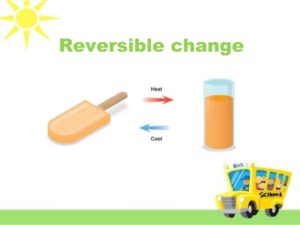‘Change is constant’. Changes happen all around us, even within us. Most of them are irreversible but some of them are reversible changes. Yes. Let’s learn about reversible changes and irreversible changes and understand the difference between them with a lot of examples.
Suggested Videos
Reversible changes and Irreversible changes
All changes in the world are one of the two types – Reversible changes and irreversible changes. A change which can happen backward, that is, can be reversed is called a reversible change. If you keep water in the freezer for some time, it transforms into ice. But as soon as you take it out of the freezer, it turns into water again. This is a reversible change. Similarly, if you boil water, it evaporates and becomes water vapor. When you cool this vapor down, it turns back to water.

(Source: slideshare.net)
A change which cannot happen backward, that is, it cannot be reversed is called an irreversible change. When you burn a piece of paper, it turns to ash. It cannot become paper again. Your height cannot decrease. These are irreversible changes. They cannot be reversed at all.

(Source: slideshare.net)
Difference between reversible changes and irreversible changes
| Reversible changes | Irreversible changes |
| A substance can return to its original state. | A substance cannot return to its original state. |
| The chemical properties of the substance do not change. | The chemical properties of the substance change. |
| Most physical changes are reversible changes. | All chemical changes are irreversible changes. |
To understand reversible changes and irreversible changes better, we need to know what physical changes and chemical changes are.
- Physical changes are changes that occur in the physical properties of the substance, like shape, size, and nature. Physical changes may or may not be reversible changes. Like, turning of water into ice is an example of reversible changes but growth in height is an irreversible change.
- Chemical changes are changes that occur in the chemical properties of the substance like its flammability, radioactivity, etc. All chemical changes are irreversible changes. Once the chemical properties of a substance are changed, it becomes another substance. Thus, it cannot return to its original state.
Browse more Topics under Separation Of Substances
Difference between physical and chemical changes
| Physical changes | Chemical changes |
| The physical properties of the substance change. | The chemical properties of the substance change. |
| Mostly reversible changes. | All are irreversible changes. |
| A new substance is not formed. | A new substance is formed. |
Examples of reversible changes
- Melting: Melting is when solid converts into a liquid after heating. Example of melting is turning of ice into water.
- Freezing: Freezing is when a liquid converts into a solid. Example of freezing is turning of water into ice.
- Boiling: Boiling is when a liquid converts into a gas. Example of boiling is turning water into water vapour.
Examples of irreversible changes
- Burning: When we burn a piece of paper or wood, it turns to ash and smoke. We cannot obtain paper and wood from the ash again.
- Cooking: We use heat for cooking, right? Once we cook our eggs, we cannot uncook them. Therefore, cooking is an irreversible change.
- Rusting of iron: You must have seen rusting of iron. When water vapour (humidity) comes in contact with the iron, they react. Therefore, iron rusts and once this happens, we cannot reverse it.
Read different techniques and methods of Separation.
Here’s a Solved Question For You:
Q: Which of the following is an example of reversible changes?
a) Burning b) Freezing c) Cooking d) Rusting
Solution: b) Water freezes, that is, it turns to ice, after keeping in the freezer for some time. But it can turn back to liquid water after removing from the freezer. Therefore, freezing is an example of reversible changes.







When Wood burn what would happened in our discussed
The changing of wheat to dalia is an example of a reversible change
What is ginning
the process of seperation cotton from cotton seeds